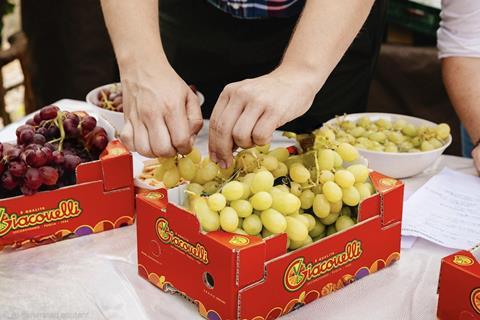Growing European demand for local grapes is good news for Italian supplier Giacovelli, but climate change continues to transform the way the country’s growers must produce

Demand for grapes in Europe is increasing, according to Anna Giacovelli, business development manager at Italian fruit supplier Giacovelli Group, whose customers, she says, are increasingly after high-quality European grapes for longer periods of the year.
“Our clients are looking for European-grown grapes to remain on the shelves from June through to December or even January,” she explains. This shift is driving a need for longer growing seasons and more sophisticated agricultural practices, as well as a greater emphasis on sustainability and innovation.
Giacovelli Group is focusing on seedless grape varieties, which increasingly dominate the segment in the European market. “We choose our varieties based on soil characteristics, microclimates and taste,” says Giacovelli. Climate change is another factor influencing these decisions, with rising temperatures and changing weather patterns making resilience an increasingly important consideration.
“Climate change is transforming the way we and our partners produce: choosing easy-to-grow and tasty varieties, producing them in different microclimates and geographical areas, installing new irrigation systems to save water, and covering our fields with the latest technologies,” she says. “Resistance to extreme conditions like drought is important in a variety, but resistance to disease is even more urgent, especially given the humidity in some of the crucial harvesting months of the European season.
Sustainability is one of the main pillars at Giacovelli, she notes. “We want it to be more than a buzzword or a marketing tool. As such we are concretely analysing all steps along our supply chain: production, packaging, technological innovation, welfare. Right now we are writing our first sustainability report.”
Giacovelli points out the importance of packaging in maintaining freshness and extending shelf-life in the grape category, but she also sees much room for improvement. “Not all materials are ideal for grapes, and some overseas packaging solutions are more robust than what we see in Europe,” she observes. “There is an urgent need for more R&D investment in this area.”
She also believes there is a need for greater collaboration across the whole Italian grape sector. “We need to work together to enhance the global reputation of Made In Italy grapes,” she says, “just as other sectors like wine, oil or apples and pears have done. Collaboration will help build a stronger international presence for Italy’s premium grape varieties.”
A lack of labour availability and rising wages have encouraged the company to increase its investments in technology, including AI and sorting machines, but Giacovelli stresses that human labour will remain crucial for delicate tasks, and calls for a unified approach on labour.
“This is where our government can and should invest more time and resources, together with companies, on new contracts, recruitment and training,” she says. “Maybe it can even be done on a European level. It’s crucial that we make the fresh fruit sector attractive and sustainable for the next generation.”



